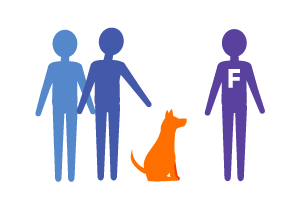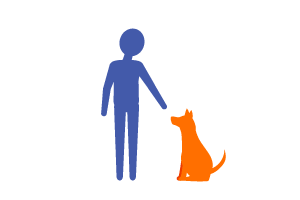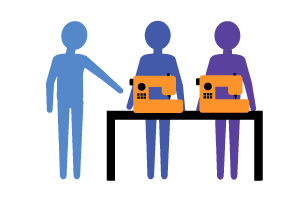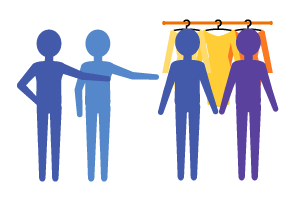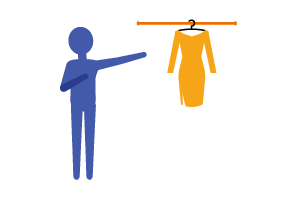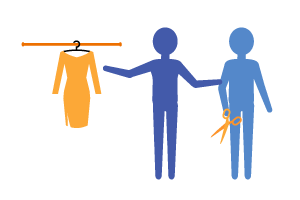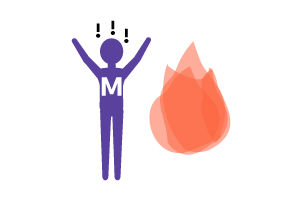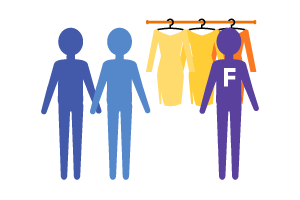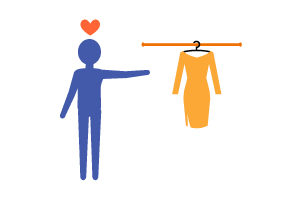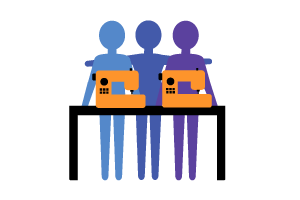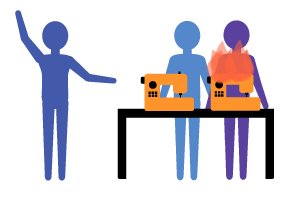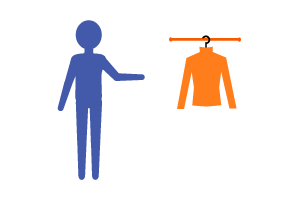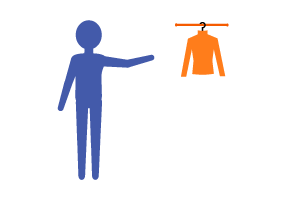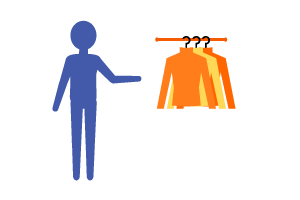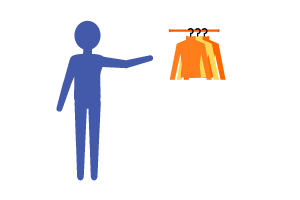Pronouns are words that replace nouns. They are used to avoid repeating the nouns to which they refer. They make writing and speaking easier and more varied.
Pronouns have many different forms and roles in sentences.
Subject pronouns perform the action in the sentence. They are used to replace nouns that act as subject of the sentence.
Object pronouns receive the action in the sentence.
Subject and object pronouns can be used in the same sentence.
-
In the following examples, the letter M and the letter F on the characters represent the pronouns identifying as male and female.
|
Subject pronouns |
Object pronouns |
Examples |
|
I |
me |
|
|
you |
you |
|
|
he |
him |
|
|
she |
her |
|
|
it |
it |
|
|
we |
us |  |
| you | you |  |
| they | them |  |
Possessive pronouns replace possessive adjectives and nouns showing ownership.
-
In the following examples, the letter M and the letter F on the characters represent the pronouns identifying as male and female.
|
Possessive adjective |
Noun & possessive adjective |
Possessive pronoun |
Noun replaced by |
|
|
my |
These scissors are my scissors. |
mine |
|
These scissors are mine. |
|
your |
Is this jacket your jacket ? |
yours |
|
Is this jacket yours? |
|
his |
The design is his design. |
his |
|
The design is his. |
|
her |
Is this dog her dog? |
hers |
|
Is this dog hers? |
|
its |
Look at its eyes! |
its* |
|
* |
|
our |
The project is our project. |
ours |
|
The project is ours. |
|
your |
The workshop is your workshop. |
yours |
|
The workshop is yours. |
|
their |
The dress collection is their dress collection. |
theirs |
|
The dress collection is theirs. |
*Its is not a common possessive pronoun.
Reflexive pronouns are used when the subject and the object are the same in a sentence. They can also put emphasis on the subject of the sentence.
-
In the following examples, the letter M and the letter F on the characters represent the pronouns identifying as male and female.
|
Reflexive pronouns |
Examples |
|
|
myself |
I made it myself. |
|
|
yourself |
You finished it by yourself. |
|
|
himself |
He got in trouble all by himself! |
|
|
herself |
She created an entire collection by herself. |
|
|
itself |
It looks amazing just by itself! |
|
|
ourselves |
We will make changes ourselves. |
|
|
yourselves |
Figure it out yourselves. |
|
|
themselves |
They travel by themselves. |
|
Demonstrative pronouns are used to talk about things or people.
|
Demonstrative pronouns |
Refers to |
Examples |
|
this |
something near the speaker in time or place, within reach. |
|
|
that |
something far from the speaker in time or place, beyond reach. |
|
|
these |
multiple things near the speaker in time or place, within reach. |
|
|
those |
multiple things far from the speaker in time or place, beyond reach. |
|
|
Personal pronouns |
Possessive |
Reflexive pronouns |
||
|
Pronouns |
Adjectives |
|||
|
Subject |
Object |
|||
|
I |
me |
mine |
my |
myself |
|
you |
you |
yours |
your |
yourself |
|
he |
him |
his |
his |
himself |
|
we |
us |
ours |
our |
ourselves |
|
you |
you |
yours |
your |
yourselves |
|
they |
them |
theirs |
their |
themselves |
*Its is not a common possessive pronoun.
|
Relative pronouns |
Refers to |
Examples |
|
who |
people |
He’s the one who created the collection. |
|
which |
objects or animals |
Faux fur, which is my favourite, is in this season. |
|
that |
people, objects or animals. It can replace who and which. |
This is the equipment that I bought. |
|
whose |
possession by a person |
This is Halston, whose talent is unbelievable. |
|
where |
a location |
The school where she studied is the best. |
|
when |
a time |
That was the week when we attended the convention. |
|
Indefinite pronouns |
Refers to |
Examples |
|
all |
the entire quantity |
Bring all the fabric you can find. |
|
another |
an additional or different person or a thing |
I will need another batch of faux fur. |
|
any |
no matter how much or how many |
It doesn’t matter, bring any quantity you have. |
|
anybody/anyone |
whichever person |
“Is there anybody willing to volunteer?” |
|
anything |
whichever thing |
She doesn't like to do anything else. |
|
both |
two people or things together |
We both like this dress very much. |
|
everybody/everyone |
all people |
Everyone needs to participate in the next project. |
|
everything |
all things |
She considered everything before making a decision. |
|
many |
a large number of people or things |
There are many fashion schools around the world. |
|
more |
a greater quantity of something or quantity of people |
They will make more money by adjusting their price. |
|
nobody/no one |
no person |
Almost no one uses real fur anymore. |
|
others |
other people |
You will need to include the others. |
|
several |
more than two people, but not many |
I had several options for my career. |
|
some |
an unspecified number or people or things |
Some of my friends decided to choose another country to live in. |
|
somebody/someone |
an unknown or unidentified person |
I’ll ask someone to come look at the problem. |
|
something |
|
He’ll need to think about something to keep his mind busy. |
|
somewhere |
an unknown or unidentified place |
I want to go somewhere this weekend. |
|
Interrogative pronouns |
Refers to |
Examples |
|
who |
people as the subject of the sentence |
Who took my scissors? |
|
whom |
people as the object of the sentence |
Whom did you give the dress to? |
|
whose |
possession by a person |
I found these pants, whose are they? |
|
which |
multiple choices or possibilities |
Which of these shirts do you prefer? |
|
what |
an object or abstract concept |
What is love? |
|
Reciprocal pronouns |
Refers to |
Examples |
| one another | Each of two or more people involved in a shared action or a relationship. | Greta and I have known one another for years. |
| each other | Two students faced each other in a duel. |








